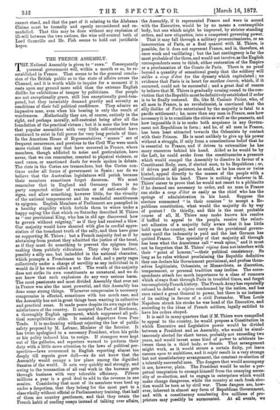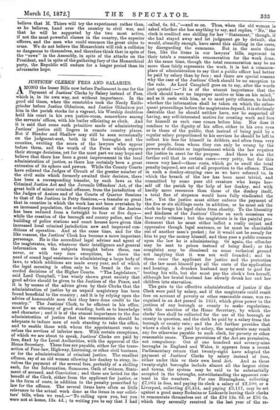THE FRENCH ASSEMBLY.
THE National Assembly is given to " rows." Consequently personal government will, within a month or so, be re- established in France. That seems to be the general conclu- sion of the British public as to the state of affairs across the Channel, and it is worth while to inquire for a moment if it rests upon any ground more solid than the extreme English dislike for exhibitions of temper by politicians. Our people are not exceptionally grave, still less exceptionally good-tem- pered, but they invariably demand gravity and serenity as conditions of their full political confidence. They admire an impassive man, even when his bearing is only the result of woodenness. lEsthetically they are, of course, entirely in the
members, though addicted to noise and gesticulation, have never, that we can remember, resorted to physical violence, or used canes, or sanctioned duels for words spoken in debate. The riots in the Cortes are tremendous, but the Cortes con- tinue under all forms of government in Spain ; nor do we believe that the Australian legislatures will perish because their members sometimes forget decorum. We must remember that in England and Germany there is no party suspected either of reaction or of anti-social de- signs, and allow something, however little, for the vivacity of the national temperament and its wonderful sensitiveness to epigram. English Members of Parliament are panoplied in a healthy stupidity which forbids them to wince under a happy saying like that which on Saturday described M. Thiers as " our provisional King, who has in old age discovered how to govern without reigning," as if they had received a blow. Our majority would have shouted with glee in cordial appre- ciation of the trenchant truth of the sally, and then have gone on supporting M. Thiers ; but a French majority feel as if by abstaining from protest they admitted the justice of the taunt, as if they must do something to prevent the epigram from making them publicly ridiculous. They obey the instinct, possibly a silly one, but imbedded in the national character, which prompts a Frenchman to the duel, and a party rages collectively under a charge of servility as any individual in it would do if he were called a serf. The wrath of the majority does not strike its own constituents as unnatural, and we do not know that such explosions do any very serious harm. The most passionate and most divided Assembly that ever sat in France was also the most powerful, and this Assembly has done some strong things. Whenever compromise is necessary compromise is effected, sometimes with too much ease, and the Assembly has not in great things been wanting in collective and practical sense. It made peace despite its own rage at the misfortunes of the country. It accepted the Pact of Bordeaux, a thoroughly English agreement, which suppressed all poli- tical susceptibilities alike. It resisted departure from Free Trade. It is moderating without rejecting the law of public
safety proposed by M. Lefranc, Minister of the Interior. It which Executive and Legislative power would be divided has twice apologized to a necessary President, when his pride between a President and an Assembly, who would be simul- or his policy induced him to resign. If strangers were kept taneously elected for short terms, probably not exceeding two out of the galleries, and reporters warned to perform their duty with a little more attention to the laws of political per- spective—laws reverenced in English reporting almost too deeply till reports grow dull—we do not know that the Assembly would occupy a low place among the dignified Senates of the world. It acts very quickly and strongly, and owing to the transaction of all real work in the bureaus gets through business with very tolerable efficiency. Fifteen millions a year is a good deal to add to the revenue in one session. Considering that most of its members were bred up under a despotism, that they belong for the most part to a class wholly without official or Parliamentary training, that half of them are country gentlemen, and that they retain the French habit of reading essays instead of talking over affairs,
the Assembly, if it represented France and were in accord with the Executive, would be by no means a contemptible body, but one which might be improved, by stricter standing orders, and new etiquettes, into a competent governing power.
That it may fall through a military pronunciamiento, or an hopes. insurrection of Paris, or a final quarrel with M. Thiers, is possible, for it does not represent France, and is, therefore, at once weak and vacillating ; but the last contingency is far the most probable of the three, and would not involve, as the English correspondents seem to think, either restoration of the Empire or a proclamation of the Comte de Paris. There is no proof beyond a quantity of sensational gossip that the soldiery will strike a coup d'etat for the dynasty which capitulated ; no evidence that Paris is in heart for another e'meute, which, if it occurred, could not be successful ; and a great deal of reason to believe that M. Thiers is gradually coming round to the con- viction that the Republic must be definitively established if order is to be finally restored. He, like M. Casimir Perier, who, of all men in France, is no revolutionist, is convinced that the silly dislike of Paris entertained by the majority is fatal to a pacific settlement.; he, more than any man in France, sees how right, and perhaps morally, self-restraint being after all the i necessary it is to conciliate the cities as well as the peasants, and foundation of the practical virtues ; but it is none the less true how impossible it is to make both acquiesce in any Govern- that popular assemblies with very little self-restraint have ment not Republican in form ; and he, of all men in France, continued to exist in full power for very long periods of time. I has been least attracted towards the Orleanists by contact In the American House of Representatives " scenes " are of with their Princes. He is most unlikely to give up his power frequent occurrence, and previous to the Civil War were much without a struggle, if only from a conscientious belief that he more violent than any that have occurred in France, where is essential to France, and if driven to extremities he has many resources behind his hand. Aided as he would be by the Left, he could evoke from the constituencies a pressure which would compel the Assembly to dissolve in favour of a Constituent Body, sure, if elected soon, to be Republican ; or, if driven past all patience, he could, as he has once or twice hinted, appeal directly to the masses of the people with a Constitution in his hand. There is nothing whatever in M. Thiers' career to prove that he would not resort to a plebiscite if he deemed one necessary to order, and no man in France can strike a coup d'etat so easily as the chief who has the springs of administration in his hand. Suppose the electors summoned " in their cornices " to accept a Re- publican constitution, what would the majority do by way of protest ? Or thirdly, and this is the most probable course of all, M. Thiers may make known his resolve if baffled to appeal to the people, receive the reluct- ant adhesion of a majority fully aware that it has little hold upon the country, and carry on the provisional govern- ment until the indemnity is paid and the last German has quitted France. The specialty of that majority all through has been what the Americans call " weak spine," and it must not be forgotten that M. Thiers' regime does not interfere with their " point of honour,"—their political consistency. So long as he rules without proclaiming the Republic definitive they can declare his Government provisional, and profess them- selves Legitimists, Orleanists, or Monarchists, as discretion, temperament, or personal tradition may incline. The corre- spondents attach too much importance to a class of rumours which always float through Paris in troubled times, and forget too completely French history. The French Army has repeatedly refused to defend a regime condemned by the nation, and has once raised a great General to power, but there is no instance of its uniting in favour of a civil Pretender. When Louis Napoleon struck his stroke he was head of the Executive, and according to the ideas of French soldiers, legally entitled to have his orders obeyed. It is said in many quarters that if M. Thiers were compelled to appeal to the country, he would propose a Constitution in
years, and would invest some kind of power to arbitrate be- tween them in a third body, or Senate. That arrangement might work, as it would secure a certain fixity, yet leave careers open to ambitions, and it might result in a very strange but not unsatisfactory arrangement, the constant re-election of a tolerably successful man. The dangers that would accompany it are, however, plain. The President would be under a per- petual temptation to exempt himself from the annoying neces- sity of re-election, and to engage in enterprises which would. make change dangerous, while the country at each fresh elec- tion would be torn as by civil war. These dangers are, how- ever, inherent in almost any form of Republican Government, and with a constituency numbering five millions of pro- prietors may possibly be surmounted. At all events, we
believe that M. Thiers will try the experiment rather than, as he believes, hand over the country to civil war, and that he will be supported by the two most active, if not the most powerful classes in the country, the superior officers, and the men who could summon the great cities to arms. We do not believe the Monarchists will risk a collision so dangerous to themselves, and therefore think that in spite of the "rows" in the Assembly, in spite of the attacks on the President, and in spite of the gathering fury of the Monarchical party, the Republic will endure for a longer period than its adversaries hope.



































 Previous page
Previous page